- within Intellectual Property topic(s)
- in United States
- within Cannabis & Hemp, Privacy and Law Practice Management topic(s)
Can a UK importer and its director be held responsible for the infringing activities of a foreign supplier? This was the question addressed by Deputy High Court Judge David Stone in his judgment, where he found in favour of the Claimants that Bodega San Huberto and GM Drinks Limited, a wine importer and distributor respectively, had infringed the Claimants' copyright in artwork by reproducing parts of the artwork on wine bottle labels. The judgment covered a range of knotty issues following the 2-day IPEC trial: primary and secondary copyright infringement, moral rights infringement, passing off and joint tortfeasorship. It provides a warning to UK importers that they could be liable for IP infringements for actions of their trusted foreign counterparts.
Background
The First Claimant, Shantell Martin MBE, is a visual artist known for a distinctive artistic style and who had collaborated with brands including Puma, The North Face, Tiffany & Co and the Financial Times. She had advertised and sold her artwork globally, including in the UK and had an online shop selling original artworks, prints, books, t-shirts and tote bags. Copyright in one of her artworks had been assigned to the Second Claimant, Found the Found LLC ('Found'). That artwork was a wall drawing of substantial size (around 4m by 12m), created by Ms Martin for a solo exhibition in New York in 2017 (the 'Work'), and is shown below:
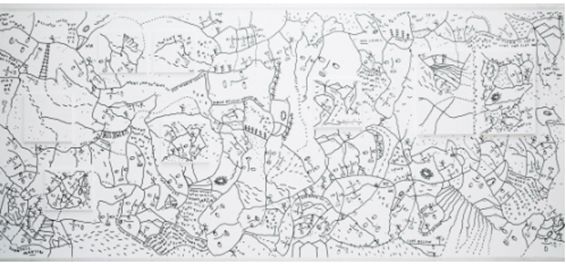
The First Defendant, Bodegas San Huberto ('BSH') was a winery based in Argentina producing wine which was sold in the UK under three different labels as below. The Second Defendant, GM Drinks, was a UK-based wine importer and distributor which imported and sold into the UK wine bearing the three labels, with the Third Defendant, Marc Patch, the director of GM drinks.
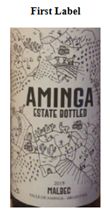 |
 |
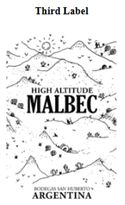 |
Found claimed copyright infringement pursuant to sections 18, 22, 23(a) and 23(b) of the Copyright Designs and Patents Act 1988 (CDPA) whilst Ms Martin claimed infringement of her moral rights and passing off in relation to her right to be identified as the author. The First and Second Defendant did not attend the trial and Mr Patch represented himself.
BSH instructed a designer, Mr Guillo Milia to design the bottle labels to be exported from Argentina. In relation to the designs, BSH said that:
- the First Label was designed on 14 May 2018, and products were imported to the market after 1 January 2020 with at least 12,600 bottles sold by GM Drinks prior to 13 April 2020. Ms Martin complained about the First Label design on 13 April 2020 (the relevant notification date) and it was redesigned;
- the Second Label was shared with BSH on 29 April 2020 and 22,680 bottles were imported to the UK and sold by GM Drinks between 2 September 2020 and 18 August 2022. Ms Martin complained about the Second Label on 7 October 2020 and undertakings were offered by GM Drinks not to sell the First Label Product.
- The Third Label was then designed and 488,250 bottles of the Third Label Product were imported by GM Drinks into the UK and sold between March 2021 and April 2024. Ms Martin complained about this design on 6 January 2022. A fourth label appears to have been designed but was not put to the court at trial.
Proceedings were also issued in Argentina and a mediation took place without reaching settlement; the Claimants' claim then ran out of time. Service out of the jurisdiction was required to initiate UK proceedings against BSH and despite proceedings being commenced on 29 June 2022 they were not confirmed by the Argentinian court until 7 February 2024. Trial took place in the UK in May 2025.
The Court's decision
Copyright infringement
Mr Patch appeared to have a difficult position before the court. He explained that he did not undertake IP clearances for the wine he imported and (quite reasonably) expected the manufacturer to do that. He did not know of Ms Martin or her work before he was contacted by her, and at that time was reassured by BSH that they would protect him in the event of a claim. Mr Patch had filed a defence that was in identical terms to BSH and had presumed that his interests would be protected by BSH's defence advanced at trial, but unfortunately for Mr Patch, BSH were sacked by their solicitors weeks before trial for non-payment of invoices and so he attended trial unrepresented. Despite Mr Patch explaining he did not sell the First Label Products after being notified by Ms Martin, products continued to leave Argentina, were imported into the UK and passed onto GM Drinks' customers. Certain aspects of copyright infringement and passing off are both strict liability torts and do not require knowledge of the infringement.
The Court considered the usual leading authorities on copyright infringement including the Infopaq test, as restated in Sheeran v Chokri and Designers Guild Limited v Russell Williams Textiles Limited on the test for originality and meaning of copying of a "substantial part". The Deputy Judge held that the First Label was "very clearly a substantial reproduction of the Work" and highlighted the particular features of the Work that had been identically reproduced, albeit with some modifications. The inclusion of a coloured illustration of which parts of the Work had been reproduced in the First Label provided a helpful guide to the Court.
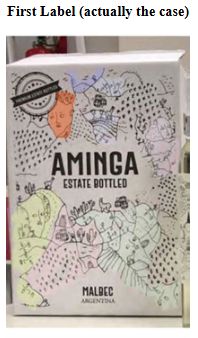
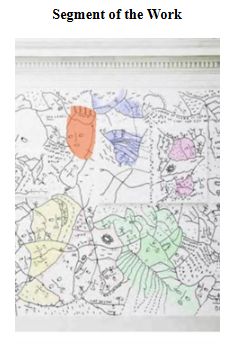
Stone DJ next considered whether the Second Label had moved far enough away to not be a copy. The Second Label was an attempt to not infringe and was a copy of the First Label but was an "inexact imitation" and sought to imitate the style of the Work, the Claimants submitted. The Claimants set out an 8-point analysis to demonstrate that the elements constituted a substantial reproduction of the Work, but Stone DJ was unconvinced this analysis assisted in assessing "substantial part", particularly as a key feature of the Work was the inclusion of humanoid faces, which was missing from the Second Label. He succinctly concluded that the Second Label was not "inexact imitations" but was instead "black and white drawings of different objects". The Second Label was found to have moved far enough away from the First Label and did not infringe the Work.
The Third Label was given short shrift – the test was not comparing it to the Second Label, but to the Work. Stone DJ was clear that it had moved far enough away from the Work and was not a substantial reproduction so did not infringe the Work.
The Court then assessed which parties had committed which acts to be liable of copyright infringement. The judgment concluded that:
- GM Drinks was liable for copyright infringement of the First
Label:
- under section 18 CDPA (issuing copies of the work to the public); and
- under sections 22, 23(a) and 23(b) CDPA (important, possessing in course of business and selling, offering or exposing for sale an article which they know or believe to be an infringing copy) in relation to any First Label Products dealt with after 13 April 2020;
- GM Drinks is not liable for copyright infringement of the Second or Third Labels;
- BSH and Mr Patch are not primarily liable for copyright infringement for any of the First, Second or Third Labels.
Moral rights infringement
Moral rights infringement was not listed in the List of Issues so Stone DJ declined to determine this, though he provided brief reasoning on the point. The Work was signed by Ms Martin, and it was possible for Mr Patch to enlarge and view the signature. As the First Label Products were distributed into the UK without an acknowledgment, Ms Martin would have been successful under s.77 CDPA, if the Court had permitted the point to be run.
Passing off
Ms Martin brought the passing off claim personally as she owns any goodwill in the Work. It was brought on two bases: false endorsement and the inherent deceptiveness of the bottles which is said to bring strict liability to BSH and GM Drinks. A false endorsement claim requires that the actions of the Defendants give rise to a false message which would be understood by a not insignificant section of the Defendants' market that the wine had been endorsed, recommended or approved of, by Ms Martin. The inherent deceptiveness claim involves a trader such as GM Drinks putting into circulation goods which are inherently likely to deceive ultimate purchasers or consumers because they bear indicia sufficiently close to those distinctive of the claimant. For either type of passing off claim, Ms Martin would need to prove goodwill, a misrepresentation and that she had suffered damage
The Court was clear that Ms Martin had the requisite goodwill in the UK from evidence such as: participating in a Tate Modern show, a solo show, extensive social media followers, and collaboration and endorsement deals which targeted the UK. What exactly the goodwill subsists in was considered, with Stone DJ concluding that specific characteristics of the Work have generated the goodwill. There were two pieces of evidence of consumers being confused about the First Label Product emanating or being connected to Ms Martin, which was enough to find misrepresentation. Similar evidence did not exist for the Second and Third Labels so no finding of misrepresentation or deception was made. It was likely that damage had been caused to Ms Martin's existing licensing/endorsement business, so GM Drinks were found liable for passing off of the First Label Products as endorsed by Ms Martin.
Joint tortfeasorship
The final issue was whether either Mr Patch or BSH were jointly liable for acts that have been found to be infringing, relying on the recent Supreme Court judgment of Lifestyle Equities v Ahmed to assist the assessment (which we discuss here). It was held that Mr Patch and BSH were jointly liable for infringement under sections 18, 22, 23(a) and 23(b) of CDPA from shortly after 13 April 2020 when they were notified of Ms Martin's complaints relating to the First Label Products. There was no joint tortfeasorship for passing off (either pre or post notification by Ms Martin) as they were not aware of the Work prior to 13 April 2020 and even after, passing off was not introduced into the case until January 2022
Comment
This case is a good example of efficient IPEC 2-day hearings, distilling points in the List of Issues to focus attention at trial; but, if it's not in the List of Issues, it's not part of the case. The court also considered preliminary issues: confidentiality of trial bundle documents and procedural matters in relation to the non-attendance of Defendants. It commented on the (lack of) availability of evidence, as the Claimants had failed to provide examples of the Second Label and Third Label products to assist the passing off case. A reminder that trap purchase evidence should be made (and retained) at an early stage of any dispute that involves a product.
It was unfortunate that BSH and GM Drinks were unrepresented but it appears the Claimants' representatives and the Judge provided considerable assistance to the individually represented Mr Patch. The Judge also declined to make findings on certain matters due to the imbalance between the parties, such as what the essential features of the tort of passing off might be for the purposes of joint tortfeasorship.
A useful case on assessing copying of a substantial part to assess infringement, but also a reminder that companies importing goods into the UK could be liable for the action (or inaction) of their foreign counterparts. UK parties should be satisfied that their suppliers are complying with UK law, including the nuances of intellectual property.
The content of this article is intended to provide a general guide to the subject matter. Specialist advice should be sought about your specific circumstances.


